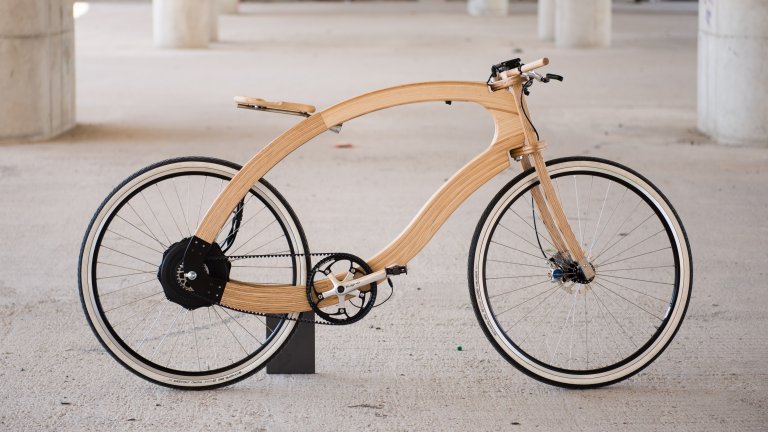
Ash Wood with an Electric Drive
Almost 2 million electric bicycles are currently touring the streets of Germany and the e-bike boom continues with no end in sight. The working group of the department “Wood Technologies” at the Eberswalde University for Sustainable Development has investigated the technological framework conditions for creating an electric bicycle made out of regional Ash wood.
The two-wheeler by the medium-sized Berlin-based furniture producer System 180, which has entered series production in 2015 and has been designed and marketed by the System 180’s subsidiary aceteam, has one key feature: all of its electric and control components are completely encased by its wooden frame. The working title for the product is “Wood E-Bike” and it utilises a design vocabulary that combines the aesthetics of historic bikes with an avant-garde aspiration.
Sustainable construction materials such as wood are at the centre of attention at the Eberswalde University for Sustainable Development in Eberswalde. One might find it only logical that the building, which resembles a forester’s lodge and in which Prof. Alexander Pfriem has his office, was also constructed close to a forest in 1937. He is the Vice-President for Research and Technology Transfer and the Head of the Working Group “Wood Chemistry and Wood Physics”.
“The electric bicycle made out of wood has a significantly lower carbon footprint than a traditional bicycle,” says Professor Pfriem.
Eberswalde University for Sustainable Development meets innovative industrial partner
"The Berlin-based business System 180, a producer of showcases and shelf systems for exhibitions and museums, was open-minded and partnered up with the working group of the Eberswalde University for Sustainable Development. In addition to running its main business, System 180 had already spent some time on looking into the topic “electromobility”. “This was the basis for initiating the joint project Wood E-Bike,” remembers Moritz Sanne, research fellow at the Eberswalde University for Sustainable Development. All was made possible by the funding provided through the programme “Central Innovation Management Mittelstand” of the Federal Ministry for Economic Affairs and Energy.
The initial period of the project focused on thorough materials research by scientists in Eberswalde. Soon the local ash tree had been chosen. “Ash trees have traditionally been used by carriage and wheel manufacturers, as their wood can withstand high dynamic loads,” explains project director Sanne, who was a carpenter originally. The in-house carpentry of the University was used to apply glue to the ash wood discs and manufacture the casing blanks. Together with two students Sanne performed innumerable bending tests, tensile tests and torsion tests.
The working group handed over models, blanks and blueprints to its industrial partner System 180, which, in turn, was then able to manufacture the e-bike according to the design developed by aceteam and to equip it with high-quality drive and control components. The project had a “positive side effect” as well. It increased the utilisation of the costly computer-controlled milling machine the Berlin-based system furniture manufacturer already owned.
For design-oriented people in metropolitan regions
"The Eberswalde University for Sustainable Development and System 180 would like to fill a market niche with their wooden e-bike for which they are currently looking for a catchy name. The two partners have identified design-oriented mobility enthusiasts with a medium-length commute in metropolitan regions as potential customers.
In comparison to design bicycles that are being manufactured in very limited numbers, the price of the “Wood E-Bike” is extremely competitive. It even uses CO2-binding wood with a long durability instead of resource consuming metal. Furthermore its technology is up-to-date and thanks to its integrative construction it provides perfect protection for its delicate electronic components.
Starting in 2015, System 180 wants to produce at first 100 bicycles per year. “Once the first 10 pieces are sold, the whole thing will become a sure-fire success,” say Prof. Alexander Pfriem and Moritz Sanne confidently. The positive feedback at fairs and the nomination for the Design-Award 2014 indicate that they might be right.